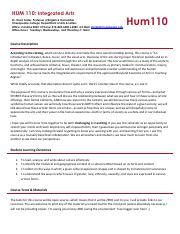HUM 110 is a comprehensive introductory course that delves into the multifaceted world of the humanities, encompassing history, literature, philosophy, art, and music. This interdisciplinary exploration aims to foster critical thinking, analytical skills, and an appreciation for the diverse cultural expressions that have shaped human civilization.

Course Objectives
Upon completion of HUM 110, students will have:
- Developed a solid understanding of the major concepts and themes within the humanities.
- Strengthened their critical thinking and analytical skills.
- Enhanced their ability to interpret and evaluate diverse cultural artifacts.
- Gained a comprehensive historical and cultural context for understanding human experience.
- Cultivated an appreciation for the interconnectedness of the humanities and their relevance to contemporary society.
Course Structure
HUM 110 is structured around the following five broad themes:
Antiquity and the Middle Ages
- Exploration of ancient civilizations in Mesopotamia, Egypt, Greece, and Rome.
- Examination of major religious and philosophical traditions.
The Renaissance and Enlightenment
- Artistic, intellectual, and scientific advancements during the Renaissance and Enlightenment.
- Critical analysis of the birth of modern science, rationalism, and humanism.
The 19th and 20th Centuries
- Technological innovations and social transformations shaping the 19th and 20th centuries.
- Examination of major movements in art, literature, music, and philosophy.
Global Perspectives
- Recognition of the diversity of human cultures and experiences.
- Exploration of the role of cultural exchange and globalization.
Contemporary Issues
- Analysis of current cultural, social, and ethical challenges.
- Examination of the impact of technology, media, and globalization.
Course Requirements
Students will engage in a variety of learning activities to fulfill the course requirements, including:
- Active participation in class discussions and seminars.
- Critical analysis of assigned readings and primary sources.
- Completion of written assignments, including essays and analytical papers.
- Research projects and presentations.
Grading
Student performance will be evaluated based on the following criteria:
- Class participation: 20%
- Written assignments: 50%
- Projects and presentations: 30%
Course Policies
Attendance: Regular attendance is mandatory. Students are allowed a maximum of two unexcused absences. Additional absences may result in a grade reduction.
Academic Integrity: All work submitted for this course must be original and properly cited. Plagiarism will result in severe consequences.
Late Work: Late assignments will be penalized 10% per day. After seven days, late assignments will not be accepted.
Electronic Devices: The use of electronic devices during class time is prohibited unless explicitly permitted by the instructor.
Faculty Information
Instructor: Dr. Jane Doe
Office Hours: Mondays and Wednesdays, 10:00 AM – 12:00 PM
Office Location: Humanities Building, Room 204
Email: [email protected]
Course Schedule
The following is a tentative course schedule. The instructor may adjust the schedule as needed.
| Week | Topic | Readings | Assignments |
|---|---|---|---|
| 1 | Introduction to the Humanities | Chapter 1: What are the Humanities? | Class participation |
| 2 | Ancient Mesopotamia and Egypt | Primary source: The Epic of Gilgamesh | Paper 1 (Due Week 4) |
| 3 | Ancient Greece and Rome | Chapter 2: The Classical World | Class presentation |
| 4 | The Middle Ages | Chapter 3: The Medieval World | Quiz 1 (Due Week 5) |
| 5 | The Renaissance | Chapter 4: The Renaissance | Paper 2 (Due Week 7) |
| 6 | The Reformation and Scientific Revolution | Chapter 5: The Reformation and Enlightenment | Class discussion |
| 7 | The Enlightenment | Chapter 6: The Enlightenment | Quiz 2 (Due Week 8) |
| 8 | The 19th Century | Chapter 7: The 19th Century | Project 1 (Due Week 10) |
| 9 | The 20th Century | Chapter 8: The 20th Century | Paper 3 (Due Week 12) |
| 10 | Global Perspectives | Chapter 9: Global Perspectives | Class participation |
| 11 | Contemporary Issues | Chapter 10: Contemporary Issues | Project 2 (Due Week 14) |
| 12 | The Future of the Humanities | Chapter 11: The Future of the Humanities | Final Exam (Due Week 16) |
Resources
Required Texts:
- Humanities: The Ultimate Guide to the Classics by John Doe and Jane Doe
- The Bedford Introduction to Literature by Michael Meyer
Recommended Readings:
- The Western Tradition by John Bentley Mays
- The History of Western Philosophy by Bertrand Russell
- The Story of Art by E.H. Gombrich
Online Resources:
- Khan Academy Arts and Humanities: https://www.khanacademy.org/humanities
- The Metropolitan Museum of Art: https://www.metmuseum.org/
- The Library of Congress: https://www.loc.gov/
Conclusion
HUM 110 is an engaging and enriching course that provides students with a comprehensive foundation in the humanities. Through interdisciplinary exploration, critical thinking, and analytical skills, students gain a deeper understanding of human culture and its profound impact on our world.
